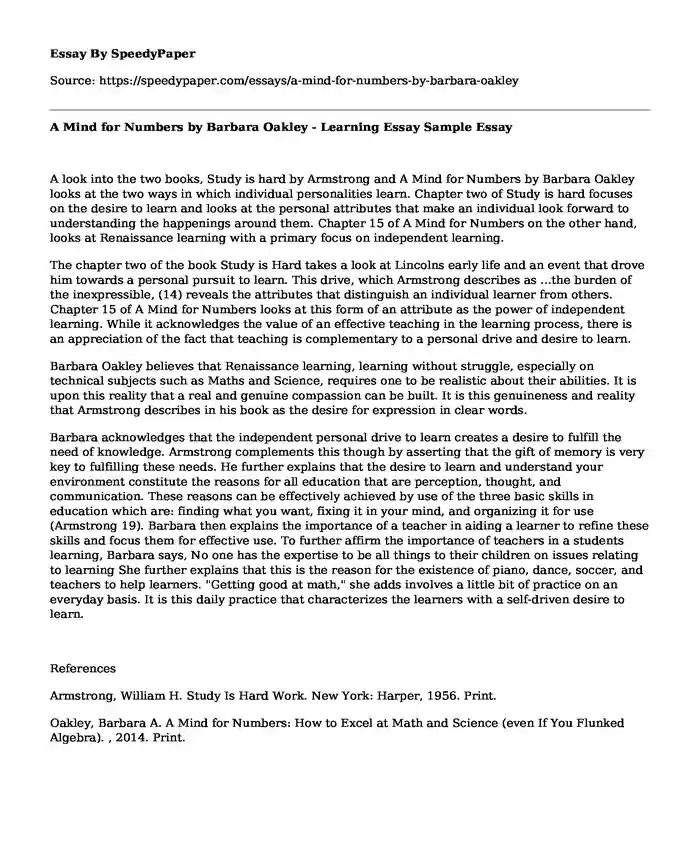
| Type of paper: | Essay |
| Categories: | Learning Education Mathematics |
| Pages: | 2 |
| Wordcount: | 469 words |
A look into the two books, Study is hard by Armstrong and A Mind for Numbers by Barbara Oakley looks at the two ways in which individual personalities learn. Chapter two of Study is hard focuses on the desire to learn and looks at the personal attributes that make an individual look forward to understanding the happenings around them. Chapter 15 of A Mind for Numbers on the other hand, looks at Renaissance learning with a primary focus on independent learning.
The chapter two of the book Study is Hard takes a look at Lincolns early life and an event that drove him towards a personal pursuit to learn. This drive, which Armstrong describes as ...the burden of the inexpressible, (14) reveals the attributes that distinguish an individual learner from others. Chapter 15 of A Mind for Numbers looks at this form of an attribute as the power of independent learning. While it acknowledges the value of an effective teaching in the learning process, there is an appreciation of the fact that teaching is complementary to a personal drive and desire to learn.
Barbara Oakley believes that Renaissance learning, learning without struggle, especially on technical subjects such as Maths and Science, requires one to be realistic about their abilities. It is upon this reality that a real and genuine compassion can be built. It is this genuineness and reality that Armstrong describes in his book as the desire for expression in clear words.
Barbara acknowledges that the independent personal drive to learn creates a desire to fulfill the need of knowledge. Armstrong complements this though by asserting that the gift of memory is very key to fulfilling these needs. He further explains that the desire to learn and understand your environment constitute the reasons for all education that are perception, thought, and communication. These reasons can be effectively achieved by use of the three basic skills in education which are: finding what you want, fixing it in your mind, and organizing it for use (Armstrong 19). Barbara then explains the importance of a teacher in aiding a learner to refine these skills and focus them for effective use. To further affirm the importance of teachers in a students learning, Barbara says, No one has the expertise to be all things to their children on issues relating to learning She further explains that this is the reason for the existence of piano, dance, soccer, and teachers to help learners. "Getting good at math," she adds involves a little bit of practice on an everyday basis. It is this daily practice that characterizes the learners with a self-driven desire to learn.
References
Armstrong, William H. Study Is Hard Work. New York: Harper, 1956. Print.
Oakley, Barbara A. A Mind for Numbers: How to Excel at Math and Science (even If You Flunked Algebra). , 2014. Print.
Cite this page
A Mind for Numbers by Barbara Oakley - Learning Essay Sample. (2019, May 29). Retrieved from https://speedypaper.net/essays/a-mind-for-numbers-by-barbara-oakley
Request Removal
If you are the original author of this essay and no longer wish to have it published on the SpeedyPaper website, please click below to request its removal:
- Representation of Immigrants in America Today
- Free Essay: Philosophical Theories Analysis
- Essay Example on Causes and Consequences of Rural America
- Is a College Education Really Worth It? Essay Sample with the Answer
- HRM Essay Sample: Terminating an Employee
- Free Essay Sample: Sweeny Community Hospital Board Meeting
- Free Essay on Nursing Administration
Popular categories




